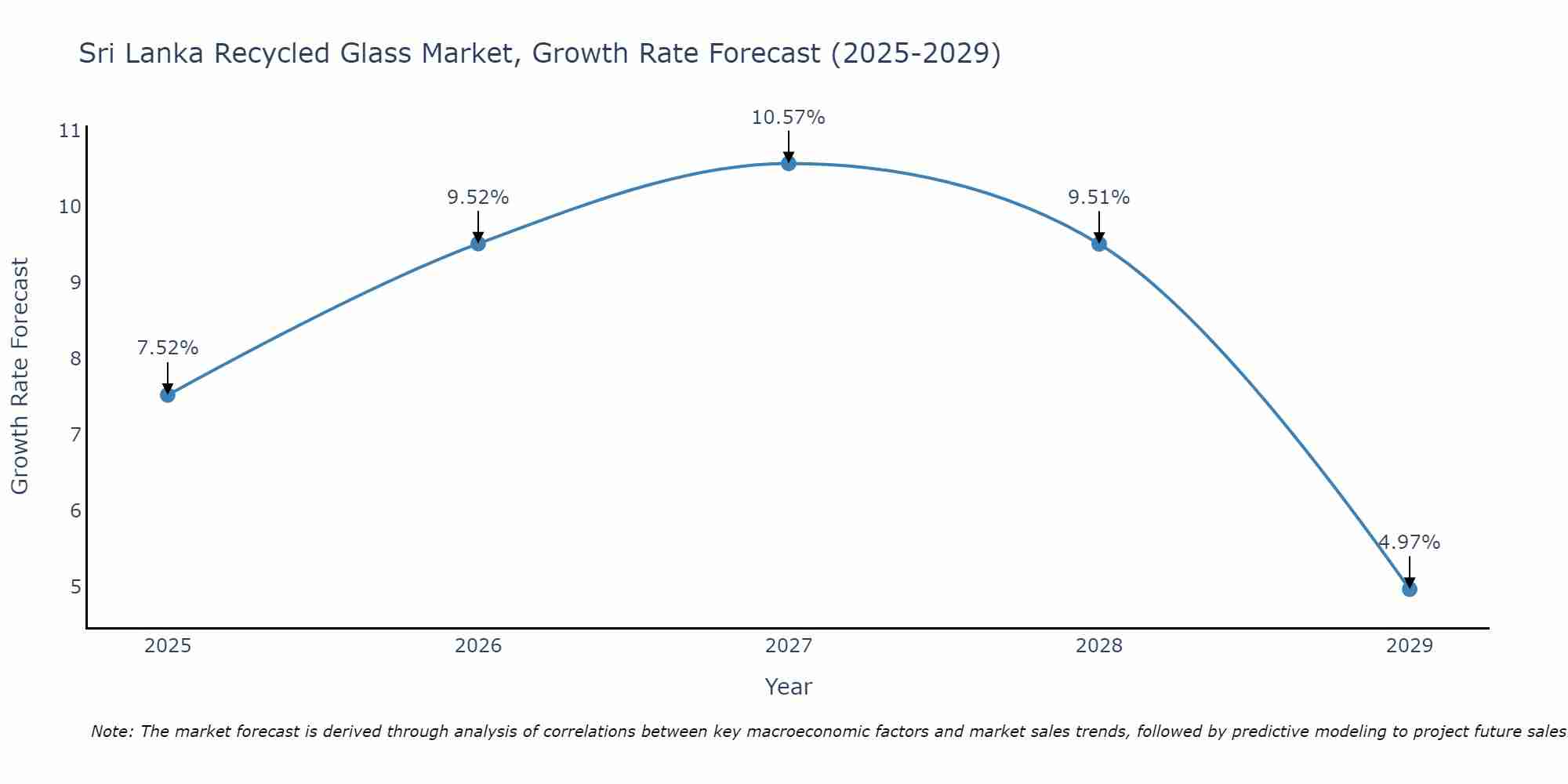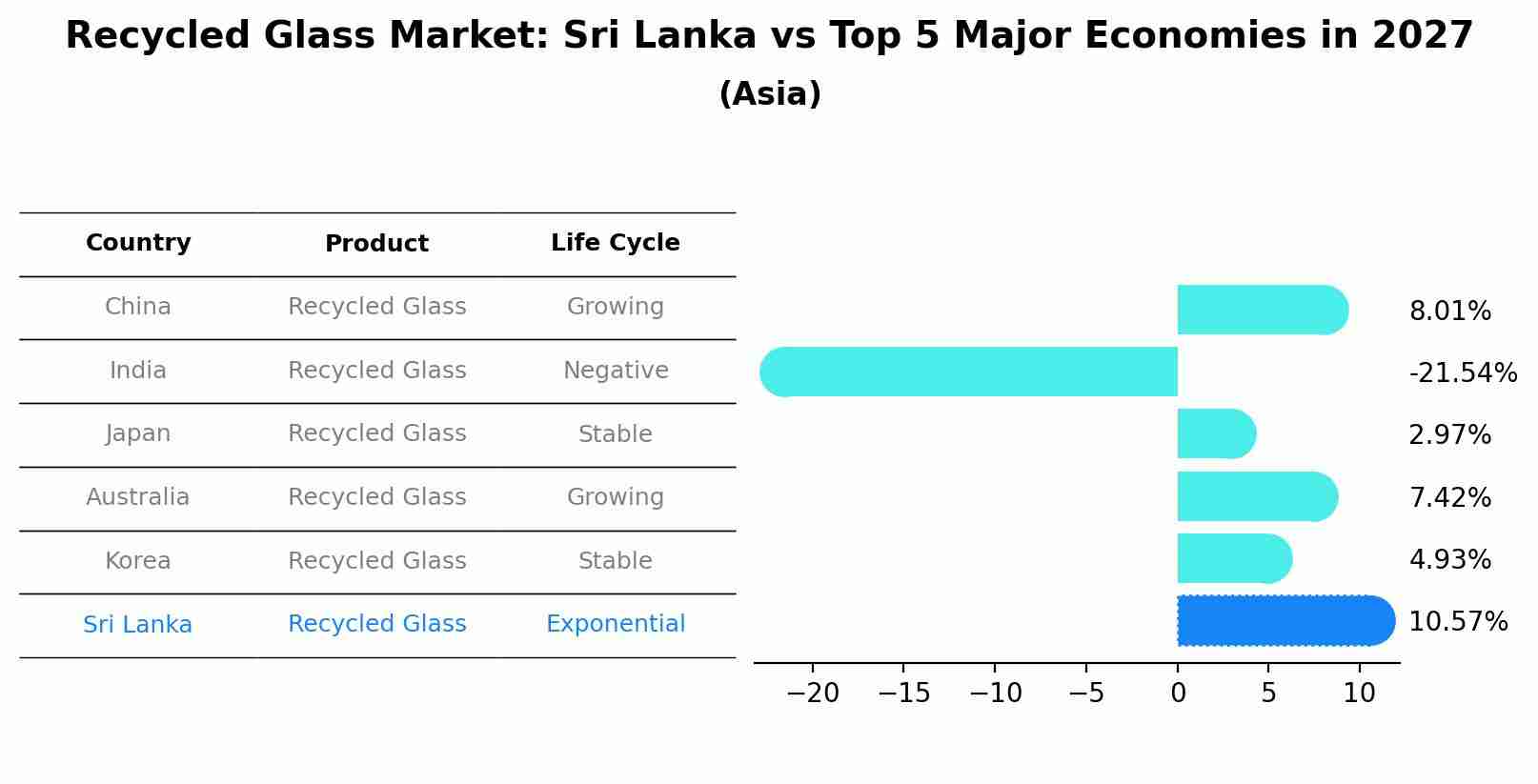Sri Lanka Recycled Glass Market (2025-2031) Outlook | Forecast, Trends, Size, Share, Industry, Companies, Value, Analysis, Growth & Revenue
| Product Code: ETC355711 | Publication Date: Aug 2022 | Updated Date: Aug 2025 | Product Type: Market Research Report | |
| Publisher: 6Wresearch | Author: Sumit Sagar | No. of Pages: 75 | No. of Figures: 35 | No. of Tables: 20 |
Sri Lanka Recycled Glass Market Size Growth Rate
The Sri Lanka Recycled Glass Market is projected to witness mixed growth rate patterns during 2025 to 2029. The growth rate begins at 7.52% in 2025, climbs to a high of 10.57% in 2027, and moderates to 4.97% by 2029.

Recycled Glass Market: Sri Lanka vs Top 5 Major Economies in 2027 (Asia)
The Recycled Glass market in Sri Lanka is projected to grow at a high growth rate of 10.57% by 2027, highlighting the country's increasing focus on advanced technologies within the Asia region, where China holds the dominant position, followed closely by India, Japan, Australia and South Korea, shaping overall regional demand.

Sri Lanka Recycled Glass Market Synopsis
The Sri Lanka Recycled Glass Market is witnessing steady growth driven by increasing environmental awareness and sustainability initiatives. The market is primarily driven by the demand for eco-friendly packaging solutions in various industries such as food and beverages, cosmetics, and household products. The government`s focus on promoting recycling and reducing waste generation has further boosted the market. Consumers are also increasingly opting for products packaged in recycled glass due to its eco-friendly credentials and aesthetic appeal. Key players in the market are investing in advanced recycling technologies to improve the quality and efficiency of recycled glass production. Overall, the Sri Lanka Recycled Glass Market is poised for continued growth as sustainability becomes a key focus for businesses and consumers alike.
Sri Lanka Recycled Glass Market Trends
The Sri Lanka recycled glass market is witnessing a growing trend towards sustainable practices and eco-friendly products. Consumers are increasingly valuing products made from recycled glass due to their environmental benefits and unique aesthetic appeal. Manufacturers are also recognizing the importance of incorporating recycled glass into their production processes to reduce waste and energy consumption. Additionally, there is a rising demand for recycled glass packaging in industries such as food and beverage, cosmetics, and household products. With government initiatives promoting recycling and sustainability, the Sri Lanka recycled glass market is expected to continue its growth trajectory in the coming years, offering opportunities for both businesses and consumers to contribute towards a more environmentally conscious economy.
Sri Lanka Recycled Glass Market Challenges
In the Sri Lanka recycled glass market, some of the key challenges include limited awareness and understanding of the benefits of using recycled glass products among consumers and businesses, which hinders market growth. Additionally, inadequate collection and recycling infrastructure, as well as inconsistent government policies and regulations related to glass recycling, pose obstacles to the development of a more sustainable recycled glass market in the country. The lack of standardized quality control measures for recycled glass products also affects consumer confidence and market acceptance. Addressing these challenges through education, investment in recycling facilities, and the implementation of clear regulations could help unlock the potential of the recycled glass market in Sri Lanka.
Sri Lanka Recycled Glass Market Investment Opportunities
The Sri Lanka recycled glass market offers promising investment opportunities due to the growing awareness of sustainability and environmental conservation in the region. With a rising demand for eco-friendly products, there is a growing market for recycled glass products such as glassware, construction materials, and decorative items. Investing in recycling facilities, glass processing technologies, and innovative product development can be lucrative in this market. Additionally, the government`s initiatives to promote recycling and reduce waste further support the growth of the recycled glass industry. Collaborating with local glass collectors, manufacturers, and retailers can also create a sustainable supply chain for recycled glass products, making it a socially responsible investment choice with long-term potential in Sri Lanka.
Jordan Agar Market Government Policies
The Sri Lankan government has implemented various policies to promote the growth of the Recycled Glass Market in the country. These policies include incentives such as tax breaks and subsidies for businesses engaged in glass recycling, as well as regulations mandating the use of recycled glass in certain industries to promote sustainability. The government has also established recycling facilities and infrastructure to support the collection and processing of glass waste. Additionally, awareness campaigns and educational programs have been launched to encourage individuals and businesses to participate in glass recycling efforts. Overall, the government`s policies aim to reduce waste, conserve resources, and create a more sustainable environment in Sri Lanka through the development of the Recycled Glass Market.
Sri Lanka Recycled Glass Market Future Outlook
The future outlook for the Sri Lanka Recycled Glass Market appears promising due to increasing environmental awareness and sustainability efforts in the country. With a growing focus on reducing plastic waste and promoting eco-friendly practices, the demand for recycled glass products is expected to rise. Government initiatives supporting recycling programs and the implementation of waste management policies are likely to further boost market growth. Additionally, the use of recycled glass in construction, packaging, and other industries is gaining traction, driving market expansion. As consumers become more conscious of their environmental footprint, the demand for sustainable alternatives like recycled glass is projected to increase, offering opportunities for growth and innovation in the Sri Lanka Recycled Glass Market.
Key Highlights of the Report:
- Sri Lanka Recycled Glass Market Outlook
- Market Size of Sri Lanka Recycled Glass Market, 2024
- Forecast of Sri Lanka Recycled Glass Market, 2031
- Historical Data and Forecast of Sri Lanka Recycled Glass Revenues & Volume for the Period 2021 - 2031
- Sri Lanka Recycled Glass Market Trend Evolution
- Sri Lanka Recycled Glass Market Drivers and Challenges
- Sri Lanka Recycled Glass Price Trends
- Sri Lanka Recycled Glass Porter's Five Forces
- Sri Lanka Recycled Glass Industry Life Cycle
- Historical Data and Forecast of Sri Lanka Recycled Glass Market Revenues & Volume By Product for the Period 2021 - 2031
- Historical Data and Forecast of Sri Lanka Recycled Glass Market Revenues & Volume By Crushed Glass for the Period 2021 - 2031
- Historical Data and Forecast of Sri Lanka Recycled Glass Market Revenues & Volume By Cullets for the Period 2021 - 2031
- Historical Data and Forecast of Sri Lanka Recycled Glass Market Revenues & Volume By Glass Powder for the Period 2021 - 2031
- Historical Data and Forecast of Sri Lanka Recycled Glass Market Revenues & Volume By Application for the Period 2021 - 2031
- Historical Data and Forecast of Sri Lanka Recycled Glass Market Revenues & Volume By Glass Bottle & Containers for the Period 2021 - 2031
- Historical Data and Forecast of Sri Lanka Recycled Glass Market Revenues & Volume By Flat Glass for the Period 2021 - 2031
- Historical Data and Forecast of Sri Lanka Recycled Glass Market Revenues & Volume By Fiber Glass for the Period 2021 - 2031
- Historical Data and Forecast of Sri Lanka Recycled Glass Market Revenues & Volume By Highway Beads for the Period 2021 - 2031
- Historical Data and Forecast of Sri Lanka Recycled Glass Market Revenues & Volume By Abrasives for the Period 2021 - 2031
- Historical Data and Forecast of Sri Lanka Recycled Glass Market Revenues & Volume By Fillers for the Period 2021 - 2031
- Historical Data and Forecast of Sri Lanka Recycled Glass Market Revenues & Volume By Others for the Period 2021 - 2031
- Sri Lanka Recycled Glass Import Export Trade Statistics
- Market Opportunity Assessment By Product
- Market Opportunity Assessment By Application
- Sri Lanka Recycled Glass Top Companies Market Share
- Sri Lanka Recycled Glass Competitive Benchmarking By Technical and Operational Parameters
- Sri Lanka Recycled Glass Company Profiles
- Sri Lanka Recycled Glass Key Strategic Recommendations
Frequently Asked Questions About the Market Study (FAQs):
- Single User License$ 1,995
- Department License$ 2,400
- Site License$ 3,120
- Global License$ 3,795
Search
Thought Leadership and Analyst Meet
Our Clients
Related Reports
- Canada Oil and Gas Market (2026-2032) | Share, Segmentation, Value, Industry, Trends, Forecast, Analysis, Size & Revenue, Growth, Competitive Landscape, Outlook, Companies
- Germany Breakfast Food Market (2026-2032) | Industry, Share, Growth, Size, Companies, Value, Analysis, Revenue, Trends, Forecast & Outlook
- Australia Briquette Market (2025-2031) | Growth, Size, Revenue, Forecast, Analysis, Trends, Value, Share, Industry & Companies
- Vietnam System Integrator Market (2025-2031) | Size, Companies, Analysis, Industry, Value, Forecast, Growth, Trends, Revenue & Share
- ASEAN and Thailand Brain Health Supplements Market (2025-2031) | Strategy, Consumer Insights, Analysis, Investment Trends, Opportunities, Growth, Size, Share, Industry, Revenue, Segments, Value, Segmentation, Supply, Forecast, Restraints, Outlook, Competition, Drivers, Trends, Demand, Pricing Analysis, Competitive, Strategic Insights, Companies, Challenges
- ASEAN Bearings Market (2025-2031) | Strategy, Consumer Insights, Analysis, Investment Trends, Opportunities, Growth, Size, Share, Industry, Revenue, Segments, Value, Segmentation, Supply, Forecast, Restraints, Outlook, Competition, Drivers, Trends, Demand, Pricing Analysis, Competitive, Strategic Insights, Companies, Challenges
- Europe Flooring Market (2025-2031) | Outlook, Share, Industry, Trends, Forecast, Companies, Revenue, Size, Analysis, Growth & Value
- Saudi Arabia Manlift Market (2025-2031) | Outlook, Size, Growth, Trends, Companies, Industry, Revenue, Value, Share, Forecast & Analysis
- Uganda Excavator, Crane, and Wheel Loaders Market (2025-2031) | Strategy, Consumer Insights, Analysis, Investment Trends, Opportunities, Growth, Size, Share, Industry, Revenue, Segments, Value, Segmentation, Supply, Forecast, Restraints, Outlook, Competition, Drivers, Trends, Demand, Pricing Analysis, Competitive, Strategic Insights, Companies, Challenges
- Rwanda Excavator, Crane, and Wheel Loaders Market (2025-2031) | Strategy, Consumer Insights, Analysis, Investment Trends, Opportunities, Growth, Size, Share, Industry, Revenue, Segments, Value, Segmentation, Supply, Forecast, Restraints, Outlook, Competition, Drivers, Trends, Demand, Pricing Analysis, Competitive, Strategic Insights, Companies, Challenges
Industry Events and Analyst Meet
Whitepaper
- Middle East & Africa Commercial Security Market Click here to view more.
- Middle East & Africa Fire Safety Systems & Equipment Market Click here to view more.
- GCC Drone Market Click here to view more.
- Middle East Lighting Fixture Market Click here to view more.
- GCC Physical & Perimeter Security Market Click here to view more.
6WResearch In News
- Doha a strategic location for EV manufacturing hub: IPA Qatar
- Demand for luxury TVs surging in the GCC, says Samsung
- Empowering Growth: The Thriving Journey of Bangladesh’s Cable Industry
- Demand for luxury TVs surging in the GCC, says Samsung
- Video call with a traditional healer? Once unthinkable, it’s now common in South Africa
- Intelligent Buildings To Smooth GCC’s Path To Net Zero


















